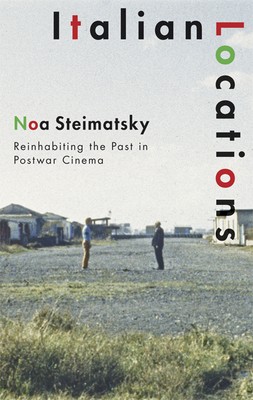
- We will send in 10–14 business days.
- Author: Noa Steimatsky
- Publisher: University of Minnesota Press
- ISBN-10: 0816650888
- ISBN-13: 9780816650880
- Format: 13.8 x 21.5 x 1.3 cm, softcover
- Language: English
- SAVE -10% with code: EXTRA
Reviews
Description
Fascism and the Second World War left Italy indelibly changed, and cinema was arguably the art that most rigorously confronted the devastated nation. In this examination of four Italian filmmakers, Noa Steimatsky brilliantly maps their forceful negotiation of Italy's identity and posits that the cinematic forms they employ constitute an imaginary reinhabiting of Italy-one that is inextricably linked with the political, physical, and symbolic predicament of reconstruction.
A dynamic intersection of pictorial and photographic, architectural and literary discourses inform Steimatsky's revisionist interrogation of exemplary works from the 1940s to the mid-1960s. From the earliest documentary work of Michelangelo Antonioni on the River Po to Pier Paolo Pasolini's re-siting of the Gospel in the arid, peripheral landscape of the Italian south, and from Roberto Rossellini's tracing of a neorealist project in ruinous Berlin to Luchino Visconti's wrought grandeur visited upon a humble Sicilian fishing village, Italian Locations probes the historical experience of displacement, anachronism, and a thoroughly contemporary anxiety in the cinematic arena.
For Steimatsky, Antonioni's modernist achievement, informed by his native landscape, Rossellini's neorealist image of Italy as a nation of ruins, Visconti's reaching back to the nineteenth century and even more archaic pasts, and Pasolini's ambivalence about modernity-all partake in a search for a politically and culturally redeemed Italy.
Noa Steimatsky is associate professor of the history of art and film studies at Yale University.
EXTRA 10 % discount with code: EXTRA
The promotion ends in 18d.06:15:11
The discount code is valid when purchasing from 10 €. Discounts do not stack.
- Author: Noa Steimatsky
- Publisher: University of Minnesota Press
- ISBN-10: 0816650888
- ISBN-13: 9780816650880
- Format: 13.8 x 21.5 x 1.3 cm, softcover
- Language: English English
Fascism and the Second World War left Italy indelibly changed, and cinema was arguably the art that most rigorously confronted the devastated nation. In this examination of four Italian filmmakers, Noa Steimatsky brilliantly maps their forceful negotiation of Italy's identity and posits that the cinematic forms they employ constitute an imaginary reinhabiting of Italy-one that is inextricably linked with the political, physical, and symbolic predicament of reconstruction.
A dynamic intersection of pictorial and photographic, architectural and literary discourses inform Steimatsky's revisionist interrogation of exemplary works from the 1940s to the mid-1960s. From the earliest documentary work of Michelangelo Antonioni on the River Po to Pier Paolo Pasolini's re-siting of the Gospel in the arid, peripheral landscape of the Italian south, and from Roberto Rossellini's tracing of a neorealist project in ruinous Berlin to Luchino Visconti's wrought grandeur visited upon a humble Sicilian fishing village, Italian Locations probes the historical experience of displacement, anachronism, and a thoroughly contemporary anxiety in the cinematic arena.
For Steimatsky, Antonioni's modernist achievement, informed by his native landscape, Rossellini's neorealist image of Italy as a nation of ruins, Visconti's reaching back to the nineteenth century and even more archaic pasts, and Pasolini's ambivalence about modernity-all partake in a search for a politically and culturally redeemed Italy.
Noa Steimatsky is associate professor of the history of art and film studies at Yale University.


Reviews